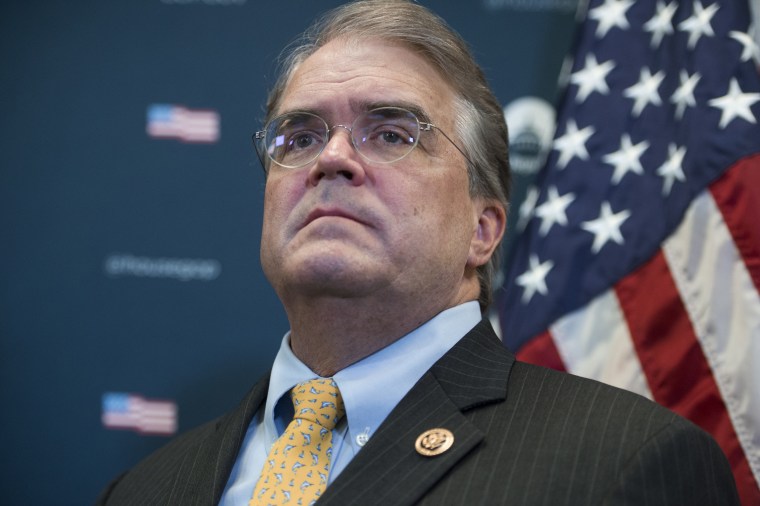WASHINGTON — Status update on President Donald Trump's relationship with Republicans in politically competitive districts: It's complicated.
"I'll be all over the country," Trump promised Tuesday night at a National Republican Congressional Campaign Committee dinner that raised $32 million for the House GOP's midterm election effort. "I'll be complaining every single trip, but I'm going to get there."
And yet there are districts where Trump is neither welcome nor likely to show up. He is at once the most effective tool Republicans have for turning out their base voters and a political lightning rod who has set the table for Democratic gains in November.
Republicans will deploy him with care, using him to raise money and record robo-calls targeted to GOP voters in some districts while landing Air Force One for major public rallies in others.
"There’s no one-size-fits all approach," said Matt Gorman, a spokesman for the NRCC. "He obviously does have a really high approval rating among our base."
Part of the difference is regional: Republicans are defending clusters of coastal-state districts in California, Florida, New Jersey, New York and other states where Trump may be more hindrance than help, but Democrats will have to win some interior-state districts where he is generally more popular to take control of the House.
That dichotomy can be seen in the 7th districts of New Jersey and Texas. Trump lost to Hillary Clinton by a little more than a percentage point in each of them. But the incumbent Republicans in those seats — Leonard Lance of New Jersey and John Culberson of Texas — have taken very different approaches to the question of what a Trump visit would mean for them.
"He lost the district by 3,800 votes in 2016, and I had the honor of winning the district by 38,000 votes," Lance said in the lobby outside the House chamber Thursday as he distanced himself from the president. "I’ll be judged based upon my positions on public policy. As you may know, I didn’t vote for the health care bill and I did not vote for the tax bill."
He said he neither expects nor wants Trump to lend a hand.
"I have never asked for help from national figures. I have always campaigned on my own and will do so again this year," he said, explaining why the president might not be as effective for him as for other Republicans. "The district is different from certain Midwestern districts — it’s a classic East Coast suburban district."

It's also different from the 7th District of Texas, where Culberson represents a portion of Houston and some of it's wealthiest suburbs — the difference between the district's mean household income ($114,506) and its median household income ($71,183) is the largest in the state.
Typically, the votes of suburban Republicans outweigh those of Democrats across the district. But their reluctance to back Trump in 2016 tipped the balance to Clinton in a longtime Republican stronghold.
Culberson, who won his own race with 56 percent of the vote in 2016, says the president has become more popular with his Republican constituents over time.
"President Trump has fulfilled every one of his campaign promises and made extraordinary progress in achieving his goals in his very first year in office," Culberson said in an interview with NBC News. "There’s a lot of good things to talk about."
Standing in a Capitol hallway Wednesday, he pulled out his smartphone and thumbed through open web browsers to land at a tally of the Republicans and Democrats who voted in the primary in his district earlier this month.
Though the Democratic primary was competitive, about 5,000 more people voted in the GOP primary. The key to his race, against the winner of a Democratic runoff between Laura Moser and Lizzie Pannill Fletcher, is getting Republicans to the polls, he said.
That's where Trump can help.
"Vice President Pence, President Trump, I hope they come to Texas often and regularly," Culberson said. "They would both be, I think, an asset to the entire Republican ticket."

White House officials did not reply to requests for comment on this story.
Among Republicans, Trump's help is seen as having higher risk and higher potential reward than that of Pence, a far safer surrogate who can also help raise money and energize Republican voters without generating the same variety of headlines — and Democratic backlash — as Trump.
It's not just Republicans who think Trump's midterm appeal is a mixed bag.
"There are swing districts all over the country, and each district is pretty unique, so I don't know that there's a blanket answer," said Rep. Linda Sánchez, D-Calif., the vice chair of the Democratic Caucus. "Certainly there are groups that are more motivated to turn out and I think that's why we're seeing increased enthusiasm on the Democratic side. Will that happen in every swing district? I don't know."
The early returns suggest that Republicans have a tightrope to walk in using Trump to rally GOP voters without sparking Democratic turnout.
In seven special House elections since Trump's victory, Democrats have gained between three points (in Utah's 3rd District( and 23 points (in Kansas's 4th District.) And, in a race unique because of allegations of sexual misconduct against Republican nominee Roy Moore — claims the candidate denied — Democrats won a December special Senate election in Alabama, a state where Trump had won by nearly 30 percentage points in 2016.
While the GOP narrowly lost the most recent special House election — held earlier this month in Pennsylvania's 18th District — some Republicans credit Trump's stretch-run visit with closing the gap between Democratic Rep.-elect Conor Lamb and Republican Rick Saccone.
Then again, the district, where Trump won by about 20 percentage points in 2016, was only competitive in the first place because Democrats were energized and unified by their opposition to the president.
Republican Rep. Pete King, who represents a safe district on Long Island, said his colleagues have to find ways to localize politics at a time when the national political environment isn't good for Republicans.
"Stress where you agree and where you disagree," King said. "There's no magic formula."
